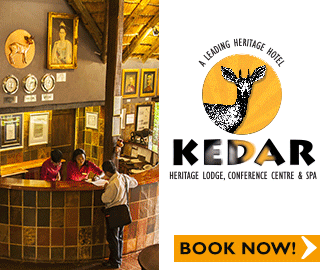
As awareness grows around WTM Africa 2018, so too has concern around the current water shortage in Cape Town and the implications this may have for visitors. Reed Exhibitions, the organisers for Africa Travel Week, inclusive of WTM Africa 2018, would like to take this opportunity to confirm that the exhibition will continue as planned.
Working with the City of Cape Town and the Cape Town International Conference Centre (CTICC), Reed Exhibitions and all of its affiliated trade shows in Cape Town, inclusive of WTM Africa, ILTM Africa and IBTM Africa, will continue in its evergreen ethos of being 'green' at shows, and 2018 will focus keenly on water saving within its direct environment and also encourage attendees to ensure they are responsible with their water use.
"The CTICC has excellent water policies in place and there will be sufficient water available for all events over the period. We are, however, encouraging all of our delegates to 'Save Like a Local' and ensure they use only their daily quota when visiting the Mother City," urges Chardonnay Marchesi, Portfolio Director for Reed Exhibitions' Africa Travel Week.
The City of Cape Town has said that business will continue as usual despite the water shortage it is currently experiencing. Visitors to the City are critical to the economy and businesses need to ensure that they are operating as per normal.
In 2017 alone, WTM Africa recorded US$ 365-million worth of business written, with close on a billion US$ recorded over the past five years. "It is vital to the tourism sector, and various economies across Africa, that WTM Africa proceed as planned, writing business for destinations, accommodation providers and tour operators a few years into the future," explains Marchesi.
"The City of Cape Town is working hard to ensure that all major events hosted in the city keep their water consumption as low as possible. Tourism has always been a mainstay of Cape Town's economy, creating as many as 300 000 jobs in peak season. We want to protect these jobs, and also ensure that our visitors are able to enjoy their time in the Western Cape while being mindful of the constraints on water use. We are therefore working with the stakeholders of the tourism sector to make sure that they, and their guests, are conscious of our water restrictions, and remain within the 50 litre daily limit," says Deputy Mayor of Cape Town, Alderman Ian Neilson.
The Cape Town International Conference Centre, too, have confirmed that they are prepared for upcoming events, and have made provision in order to guarantee each event has sufficient water.
"The Cape Town International Conference Centre has been reducing its water consumption through its environmental sustainability practices for several years. Over the last 6 years, we have reduced our consumption by an average of 8 million litres per year. In addition, our latest water account shows the CTICC has already recorded a 42% saving in water consumption for the first quarter of its current financial year compared to the same period last year. Indeed, our rain water and grey water re-use system has been very effective in reducing our use of municipal water," explains Julie- May Ellingson, Chief Executive Officer at CTICC.
WTM Africa, together with its partners, will be doing on-site drives, educating attendees about water usage and how to be water wise during this period. "We know this is an important cause for WTM Africa 2018, and as such are dedicating whatever resources we can to teach people about water scarcity and how to use less in their daily lives, while still enjoying a productive and meaningful exhibitions," furthers Marchesi.

WTM Africa 2018 encourages attendees to Save Like a Local
BY REDLIP | 26 FEB 2018 15:05
With a water conservation mindset, WTM Africa 2018 looks forward to driving education around water scarcity and usage through attendees from across the world. The exhibition, to be held in Cape Town from 18-20 April 2018, will work with the City of Cape Town to ensure that its attendees understand how water can be saved within the tourism sector, and how exhibitions can use less water.










